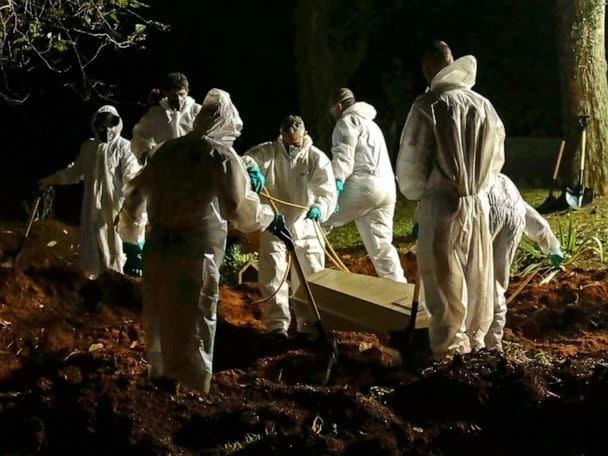As Brazil emerges as an epicenter of the coronavirus pandemic with a virtually uncontrolled outbreak, the country’s regional neighbors are experiencing a worrying increase in infections.
Brazil, where a more contagious variant of the new coronavirus is circulating, saw a record 3,869 people die of COVID-19 on Wednesday, its highest single-day count so far, according to data compiled by Johns Hopkins University. In total, the country had more than 12.8 million confirmed cases of COVID-19, including more than 325,000 deaths. The case count in Brazil and the number of deaths caused by the disease are now only behind the United States, according to Johns Hopkins data.
The regional director of the World Health Organization for the Americas, Carissa Etienne, warned that COVID-19 is emerging “dangerously” throughout Brazil and called on all Brazilians to take preventive measures to prevent its spread.
“Unfortunately, the terrible situation in Brazil is also affecting neighboring countries,” said Etienne at a news conference last week.

But Brazil’s far-right president, Jair Bolsonaro, is still not convinced of the need for restrictions on activity, arguing that such measures infringe personal freedom and the resulting economic destruction would be worse than the virus itself.
Many other South American nations are now blaming the uncontrolled outbreak in Brazil, as they see their own numbers increase. Several closed borders, suspended flights, imposed blockades or implemented other restrictions in an effort to control the virus.

Venezuelan President Nicolas Maduro said last week that “Brazil now poses a threat to the world” and blamed Bolsonaro for his “reckless attitude” towards the pandemic. Although the Venezuelan government has not released the official figures for COVID-19, Johns Hopkins data show that the country is facing a severe wave of new infections. There were 1,348 new confirmed cases in Venezuela on Wednesday, the country’s highest daily total ever recorded, according to data from Johns Hopkins.
An opposition medical group said Venezuelan hospitals were fighting the number of intensive care patients and calling for more ventilators.

In Colombia, there were 11,449 new confirmed cases of COVID-19 on Thursday, the highest single-day count in the country since the end of January, according to data from Johns Hopkins.
Last week, Colombian President Ivan Duque canceled a scheduled trip to Brazil to meet Bolsonaro, citing the worsening outbreak in the country. Earlier this year, Colombia banned flights from Brazil due to the variant there.

Ecuador has seen an alarming increase in COVID-19 cases since the beginning of the year and recently imposed a curfew block in eight provinces
There were 7,868 new confirmed cases in Ecuador on Thursday, the country’s highest daily total since mid-June, according to data from Johns Hopkins.

Peru announced last week that a study by the country’s National Health Institute revealed that approximately 40% of COVID-19 cases in the capital Lima are due to the variant Brazil, which entered the country’s Amazon region earlier this year. The Peruvian government has banned all flights from Brazil until April 15.
There were 19,206 new cases confirmed in Peru on March 25, the highest single-day count in the country since early August, according to data from Johns Hopkins.

Bolivia temporarily closed its border with Brazil for seven days, starting on Friday. Officials said there would be scope for some international trade during the closure.
There were 1,072 new confirmed cases of COVID-19 in Bolivia on Tuesday, the country’s highest daily total in more than two weeks, according to data from Johns Hopkins.

Chile, which has one of the fastest COVID-19 vaccination rates in the world, saw its case count surpass the 1 million mark on Thursday amid 7,868 recently confirmed infections, the highest single-day count in the world. country since mid-June, according to Johns Hopkins data.
The Chilean government closed the country’s borders for the month of April and tightened restrictions on movement amid an already severe blockade. The new measures came when authorities warned that hospitals were almost filling up with younger victims of the disease.

Argentina warned of an “explosive increase” in COVID-19 cases, prompting local authorities to implement new restrictions, encourage people to work from home, close land borders and ban flights from several countries, including Brazil and Chile. The Argentine government is also delaying the administration of the second dose of COVID-19 vaccines for three months in an effort to place the first doses in as many arms as possible “to maximize the benefits of vaccination and lessen the impact of hospitalizations and mortality.”
There were 16,056 new confirmed cases in Argentina on Wednesday, the country’s highest daily total since mid-October, according to data from Johns Hopkins. Authorities estimate that cases have increased in the capital, Buenos Aires, by more than 30% in the past week, compared to the previous week. The new wave of infections is suspected to be caused by three highly contagious variants that are believed to have originated in Brazil, the United Kingdom and the United States.
As Brazil becomes the epicenter of COVID-19, cases increase in South America and originally appear on abcnews.go.com
